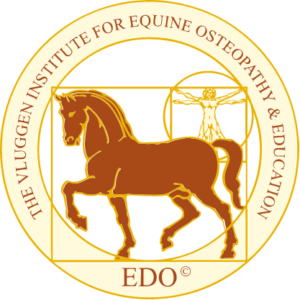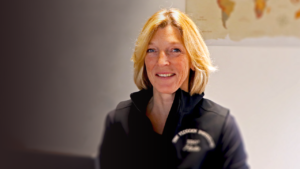
In the last two decades the demand for the Equine Osteopathy has been embraced and recognized by the horse community and the veterinarians and has become rather popular. This increased demand and popularity resulted in an unforeseen problem:
Non-educated individuals were calling themselves equine osteopaths and were practicing on horses in manners that did not represent the principles of osteopathy as they were taught at the Vluggen Institute and all the other educational institutes in Europe. There was no legal protection nor recognition of the Equine Osteopathy as such anywhere in the world.
Janek Vluggen was asked as the foremost outpost to create transparency and show the veterinarians and horse community who is or who is not educated. After meetings with several veterinary as well as human osteopathic associations in the Netherlands and Germany, the Dutch registry for human osteopaths and the equine osteopathic educational institutions in Europe, Janek Vluggen created and trademarked the wordmark “Equine Osteopath EDO®” as a quality mark to only be used by graduates of standardized equine osteopathy educational institutions.
To support this, The International Registry for Equine Osteopaths, a professional International Association for Equine Osteopaths was founded out of the graduates from the different equine osteopathic educational institutes. By a special committee from the association members a code of ethics and the standards for equine osteopathy and the equine osteopathy education were written according to the Can Med Model, (the Canadian Medical Education Model) to establish a standardized high level equine osteopathy education and profession worldwide. All controlled by the International Registry for Equine Osteopaths with committees of complaint, appeal, enforcement and postgraduate educational accreditation. The rights for using the wordmark “Equine Osteopath EDO®”, have been transferred by notary act to the International Registry for Equine Osteopaths and are no longer exclusive for, in the possession of or under the influence of the Vluggen Institute, as it was meant to be from the start.
It was inherent to the European osteopathic development that was chosen for the Equine equivalent of the Human Diplomat Osteopath (D.O.) to develop the EDO® wordmark, the Equine Diplomat Osteopath, to clarify that Equine Diplomat Osteopaths are not veterinarians or by no means perform or replace veterinary medicine.
A Diplomate stands for a person who is trained and educated extensively in a specialty beyond the regular borders of their basic education. There are many additional educations in Europe, Canada and the USA, granting the pre-verb Diplomat in order to express the extensive training beyond the regular basic education.
After finishing all lectures, wet labs, demonstrations and dissection classes of the Equine Osteopathic Educational Institution, the participant has to take an independent final exam before the exam committee of the International Registry of Equine Osteopaths.
Passing the international exam allows the participant to register with the International Registry for Equine Osteopaths, which then grants the participant the usage of the wordmark Equine Osteopath EDO®.
Participants from all the different Equine Osteopathic Educational Institutions can take the independent final exam of the International Registry of Equine Osteopaths to be able to register and be granted the usage of the wordmark Equine Osteopath EDO® if they meet the standards as written down in the registry act.
The Vluggen Institute is very proud to be the only Equine Osteopathic Education in the world that meets the high standards of the International Registry of Equine Osteopaths and strives to maintain its high level of education through research and development, innovation and courage.
The Vluggen Institute feels very honored to be awarded as best in the category of research and development in two consecutive years 2015 and 2016, by the city of San Marcos Texas USA.
